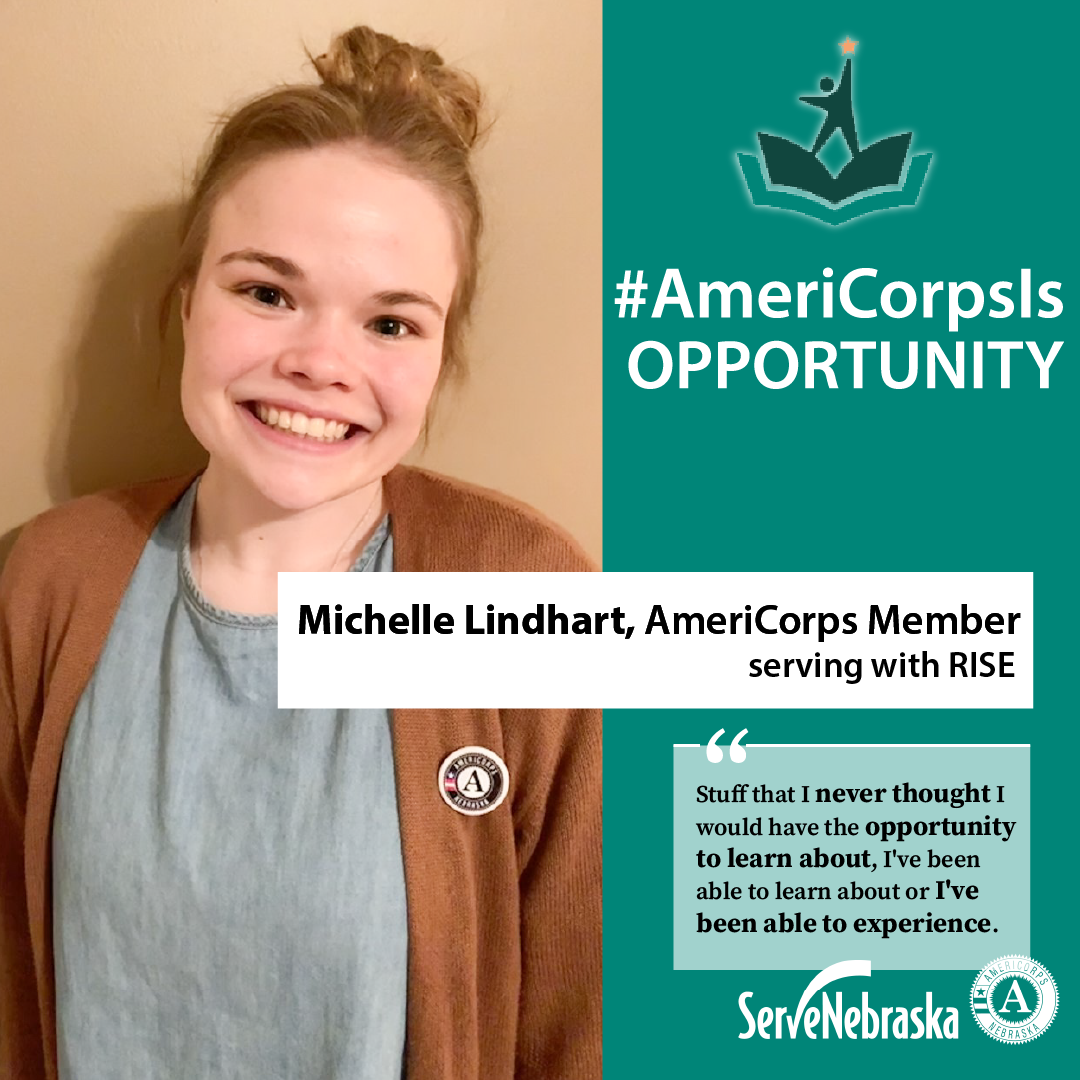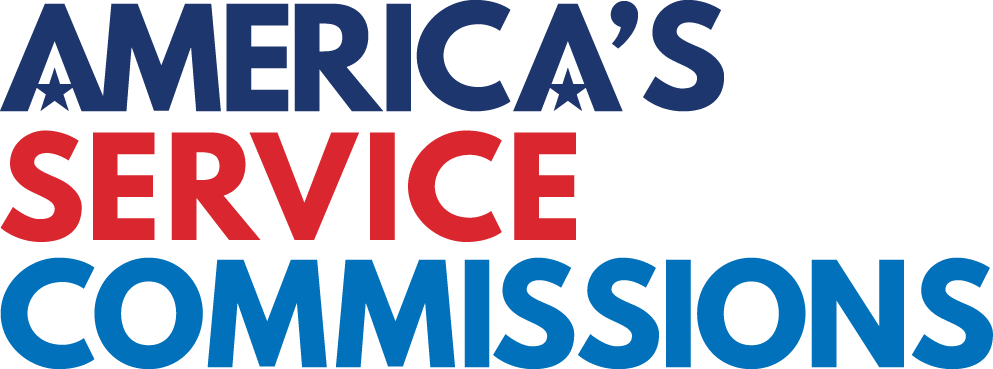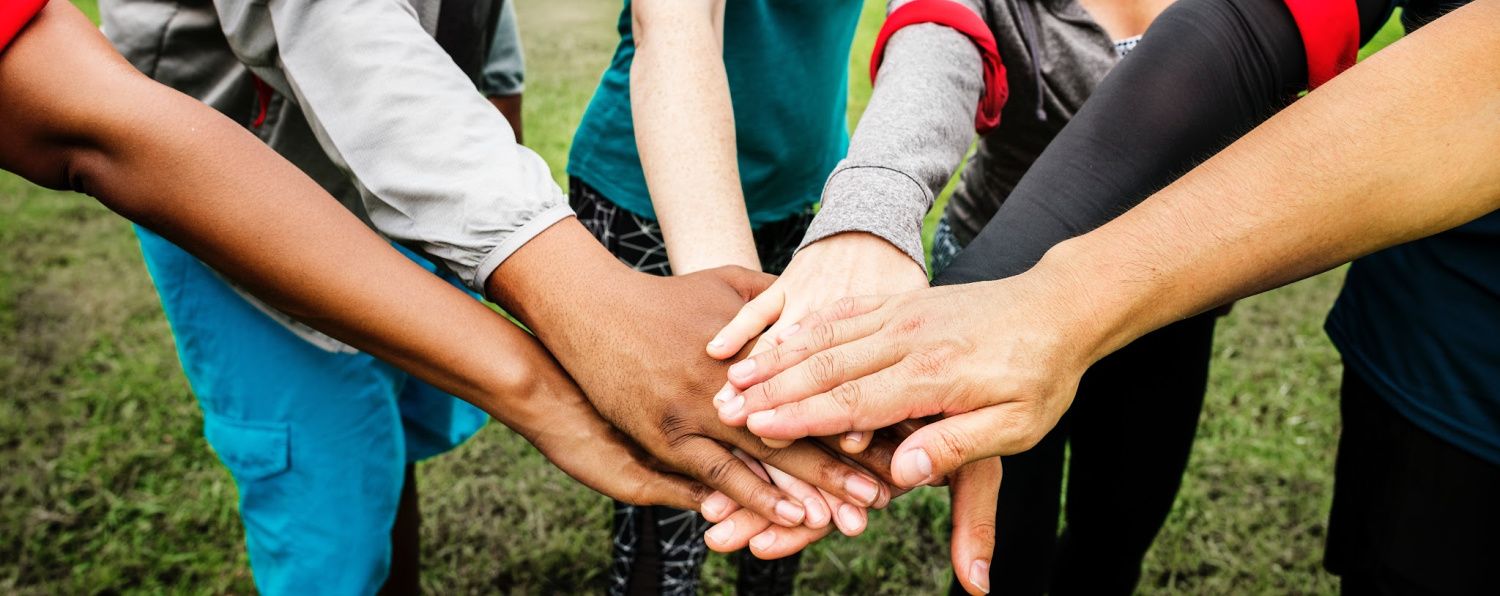
Michelle is originally from a small town in Iowa and graduated in 2020 with a degree in Psychology and Spanish.
After graduation, she moved to Lincoln, Nebraska looking to focus her passion and found AmeriCorps! Now she’s an AmeriCorps member serving her first term with the Recognizing Increased Skills in Education program.
ServeNebraska: In one or two words, what is AmeriCorps to you?
Michelle Lindhart: Service and opportunity.
SN: How did you first hear about AmeriCorps?
ML: I found the RISE program on the Nebraska State government website, and it stated it was an AmeriCorps program and from there, I researched AmeriCorps to kind of figure it out. I’d heard about it here and there, but I really hadn't done much research until I saw the posting.
SN: What is it about the RISE program that interested you?
ML: I love psychology and I love working with youth! And I have been fascinated about working in the criminal justice system, utilizing forensics, applying psychological theories, especially with psychopathology. I just love all that, I geek out about it, and the RISE program was that plus youth and I love youth. It was just a good mixture of psychology, a good mixture of hanging out with youth, service, and learning opportunities. I couldn't pass it up.
SN: Ultimately was that one thing that made you decide, AmeriCorps is right for me?
ML: I think it had to really do with the opportunities that AmeriCorps offers. So not just opportunities now in regard to building connections within Lincoln, Nebraska. But afterward, as well, you know, supporting educational development, supporting professional development. I find that fascinating and interesting and awesome. Like, I need that. So I think that's what really drew me to AmeriCorps and just kind of a, an essence of knowing that I can give back to people because I've been so honored to receive support and love from a lot of different people, and I would love to be able to do that, as well, and kind of give back to people.
SN: What have you learned as an AmeriCorps member?
ML: I've learned a lot, let me tell you, in a very short amount of time, which is fascinating. I think, for me, in regards to like the RISE program I would just say, the impact of personal experiences on individual development, which sounds kind of weird, but I've learned how understanding through communication, patience, openness, and vulnerability, is a great way to mend any sort of gaps that exist between myself and another individual that I'm serving. Because I know that their experiences are much different than mine. I mean, I grew up in a town with 3000 people in small-town Iowa. Yeah, so it was kind of a big, a little bit of an interesting wake-up call for me when I got here. And just learning how to communicate, learning how to take the time to ask questions, as well be okay with having those conversations with people and understanding that, “Hey, I got stuff to learn, please teach me,” and then hopefully passing along that inspiration to other people as well.
SN: In your opinion, who benefits most from AmeriCorps programs?
ML: I think with RISE, I've seen so much growth and development for those youth. I will say I do benefit because I obviously have gained so much knowledge, so many skills. I’m taken care of by AmeriCorps too, like I have everything that I need. But I also know that just being in this position, I have seen so many youths just have the opportunity to get to know other youth, first of all, who have had similar experiences, but also just have an opportunity to receive both the information and the support that the RISE program offers through AmeriCorps. So I would say, both of us.
SN: What is the average day like as an AmeriCorps member serving with RISE?
ML: Yes. So my days vary. But for the most part, I've gotten a really nice schedule down. So what I do is I get to the office, probably usually around nine. I am in the office all day because I have a variety of different things that I do. I communicate with POs regarding their youth, I enter like engagements (kind of like reports on my interactions with youth), contact youth, I contact community members in regard to whether it be like youth opportunities or youth resources, or facilitating a group at a facility. A lot of different stuff. I'm developing materials for the curriculum and presentations. So that's what I do when I'm in the office.
When I'm outside the office, which usually ends around 4ish, then I go on to have groups. Currently, I have, I think, seven groups, and I meet with all of them in the community. So I don't stay in the office. Groups are an hour-long, so from 4 until about 6:30 or 7, I'm doing groups in different places.
SN: What is your favorite part of serving as an AmeriCorps member?
ML: It's got to be the youth. They are a hoot! They can be challenging sometimes, and you know, that's okay. Because we're we've all had our moments, you know? I'm working with teenagers, so they're going through a lot of developmental milestones in their life right now. Um, but I love working with them! I love learning from them. I love just being able to be kind of a positive presence in their life, and just be able to teach them about skills that they might be familiar with, but encourage them to continue to use them and continue to develop them.
SN: Do you have a favorite memory from your service so far?
ML: Oh, this happened actually, today, I work with a lot of youth who are truant, so they have really struggled with going to school. We're talking about missing weeks of school, and just having a youth going to school for two days in a row is so exciting. I had a youth recently get a job, which is also great. Also just breaking free of really bad behavior, so watching them just kind of grow. And like I said, it's so small, but they're huge in the eyes of the youth! And they're huge in our eyes too, because we know that it's a big step to make those changes! So those would have to be some of my favorite memories would be just watching the youth grow and develop and take on the world.
SN: How has COVID affected the ways that you serve?
ML: Yes. I've done a couple of groups virtually, but I've worked really hard to continue to facilitate groups in person. Because I have found that our youth really, really struggle with verbal facilitation. Because they don't want to go to school, a lot of times, and they're going to school virtually as well. So just sitting through another group virtually is not ideal. So when I do have to do those groups that are virtual, that can be challenging, just because it's really, really hard to connect with the youth when you know, I'm just using a screen and I'm not there, especially with Wi-Fi issues, you just don't ever know. So it's sometimes difficult for me to pick up on their nonverbal communication. I can't see their nonverbals necessarily through the screen, which makes it very difficult for me to kind of gauge how they're feeling, whether or not they're paying attention, and that they're understanding.
SN: How has AmeriCorps service affected your future plans?
ML: That's a great question. It has definitely solidified what I want to do. Like I said, when I started, I was kind of thinking about potentially going back and getting my education in education, so I could be a teacher. But as I've served with the youth in my position through AmeriCorps, I have found that serving with youth in the criminal justice system, or just the criminal justice system in general, it’s where I belong, and is where I want to go. So I've started to look into different grad school programs that kind of bring together everything that I do in this position. I'm hoping that what I'll be able to do is, from my experience, develop a thesis, because there's a lot of things that I've seen that I would love to research. I know what I want to study. I know where I want to go after I study. And I'm pretty solidified on that.
SN: Has AmeriCorps changed you in any way? And if so, how?
ML: Yes. Oh, yes. In a variety of different ways. Especially with my position. Like I said, growing up in small-town Iowa, I thought I understood a lot of different things. I thought I had life experiences, you know, I studied abroad in Mexico, I thought I understood, I got that element of just being culturally and worldly competent. Through my position, I have found that there is so much I do not know, especially in regard to like family structure and youth behavior, and a lot about how to go about successfully and positively interacting with youth who have experienced trauma, or any sort of type of challenge in their life that's really affected them, mental health challenges and learning disabilities. So through my position, I would say, I've definitely learned what it means just to be an open, vulnerable, honest, communicator and [how to] support youth of all different backgrounds, all different experiences, all different ideas, beliefs, and being willing to sit down and listen to them actively, but also converse with them, and have those tough conversations with them.
SN: What would you say to someone who's considering AmeriCorps service?
ML: Hands down, do it. It's challenging. Especially if you're in a full-time position. It's a lot of time and dedication, but the people that you meet, the opportunities that you have through AmeriCorps like, for example, yesterday, I just became a certified criminal justice information service person. So now I can access criminal information because I have a certificate for it. Stuff that I would have never thought I would ever have the opportunity to learn about, I've been able to learn about or I've been able to experience. Also just the amazing people I serve with. I know that I've developed lasting relationships that go beyond just my position as a specialist, and I'm excited to see where they go as I continue to grow and develop in the future. It’s life-changing.


